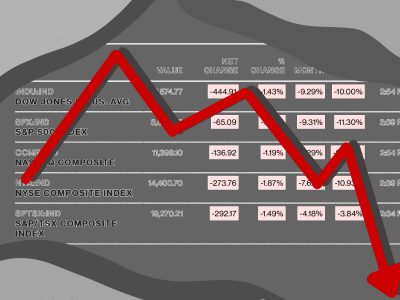Exactly six weeks until the November midterm elections in the United States, the Standard & Poor’s 500, a stock market index that evaluates performances of approximately 500 companies, dropped 4.3% in one day, the worst day the S&P has had since June of 2020 in the early days of the coronavirus pandemic.
This drop was primarily due to the August Inflation Report from the U.S. Department of Labor, which announced that the consumer price index increased by 8.3% in the last year. The Federal Reserve has been combating these increases by raising interest rates, leading to the drops in the stock market indexes.
But S&P 500 is not the only index that is struggling.
Many of the main stock market indexes, such as the Dow Jones Industrial Average and the NASDAQ composite, have also been falling recently, and, similarly to the S&P, these stock market indexes are affected by rising inflation and increased interest rates. All of the stock market indexes mentioned are far from the peaks they hit at the end of 2021 and beginning of 2022.
While this information is important to look at for many reasons, such as the current debate economists are having over whether the U.S. is approaching a recession or not, my concern lies with the crucial implications these stock market drops could have for the upcoming midterm elections.

The recent stock market drops have called into question which of the key issues on the ballot this November will be the deciding factor in the outcomes of the elections. I am becoming more concerned by the day that the financial situation in the United States will overshadow more important issues to be voted on, such as abortion, LGBTQ+ rights and more.
I began to have concern over this issue when an old expression came to mind: voting with your pocketbook.
This expression stems from the idea that people often vote for candidates who will benefit them financially. I expect that many Americans will go to the polls this November with the intention of voting with their pocketbooks. Given the current financial climate, this would most likely mean an influx of Republicans voted into Congress during the midterm elections due to their ideologies of decreasing taxation and government spending — although, economic growth is generally higher under Democratic presidents.
This concept makes complete sense, and wouldn’t normally be a problem. However, I urge people to remember that these are irregular times. While the stock market might be crashing at this moment, and that might scare some into voting for candidates they think will be more fiscally conservative, I remind people of two important things.
One, the market will eventually go back up. Looking at trends in the market, the stocks have recovered from even the extremely damaging crashes, such as the stock market crash of 1929, and the bear market of the U.S. financial crisis of 2008. The stock market also crashed at the beginning of the coronavirus pandemic, with the Dow Jones even dropping in the 19,000s from the pre-pandemic 29,000s. The market recovered all of these previous times, and the market will recover again.
While these market crashes are hurting the U.S. right now, it will ultimately recover.
Two, there are higher priority issues on the ballot this November that will dictate the near and far future of the U.S. election deniers, who are willing to overturn democracy in order to be elected, that are running for office. LGBTQ+ rights and gun control are on the ballot. On top of this, getting a vast majority of Democrats in both Congress and the Senate would give a chance for abortion rights to be codified into federal law. These rights, if taken away from the American people, would take years, if not decades, to regain.
Whereas economic recovery can and generally does occur quickly, laws tend to become entrenched — changing them can be slow and cumbersome.
Compare the 25 years it took for the Dow Jones to recover after the 1929 stock market crash to the near century it took after the Civil War to get any significant civil rights legislation. It is imperative, therefore, that in the upcoming election, those who generally vote with their pocketbook instead keep an eye on the legal outcomes they desire, and trust that the economic world will right itself, as it historically has before.
This November, these issues will be pitted against one another to see which hold the most value with the American people. I hope this market crash will not win the battle, but only time will tell.





Conversely, why not trust that the civil rights world will right itself?
Katie
Yes, people do vote their pocketbooks. When we have high inflation, at least in part caused by
excessive government stimulus, people do get hurt, many at the lesser levels of income, who
find with rising prices it is difficult to pay rent, buy food, pay their bills!!
We on the one hand have a Federal Government with at least 1 economist, Ms. Kelton comes to
mind, who subscribe to a theory, Modern Monetary Theory (MMT) , which posits that to finance
Deficits, we can print money without limits with no effects. Deficits , the gap between what
the Federal Government brings in in Personal, Corporate, and User Fees and Tariffs, and
Spending (Expenditure) can be financed in 2 ways. You can Borrow the money, buy issuing
Interest Bearing 10 year, 20 year, and 30 year interest bearing T-Bills. Or you can have the
U.S. Treasury Print currency. Borrowing money by having the U.S. Treasury issue Interest
Bearing T-Bills is the less inflationary route. Printing money by the U.S. Treasury is highly
inflationary.
In Germany, in 1933, the Weimar Republic, as a result of War Reparations Debt forced in
it by England and France in 1919 per the Versailles Treaty, had no other options to pay the
Brits and French than to print huge numbers of Deutschmarks to buy British Pounds and
French Francs. By 1923 Germany had roaring Hyperinflation, the type we one week a wallet
full of Deutschmarks bought a shopping basket full of food, and 5 weeks later a shopping
basket full of Deutschmarks was needed to by the same shopping basket of food!!!
This is what Ms. Kelton and her MMT bunch, Biden’s advisors, support!!!!!!!!!!!!!! Unlimited
money printing to finance Deficits!!!!!
We now have a Federal Reserve which is increasing Interest Rates to bring Inflation under
control, and a Federal Government which is on a Wild Spending Spree, printing money,
which is Inflationary!!! This is like having 2 Cars driving at 100 miles an hour straight
at each other!!!!!